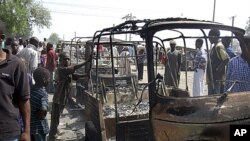The spokesman for Nigeria’s opposition Action Congress (AC) Party said the latest government security effort is unlikely to succeed against threats posed by the Boko Haram Islamist sect.
Lai Mohamed said the only way the administration can resolve what he called the “Boko Haram menace” is to engage members of the sect in negotiations to resolve their concerns.
The administration this week ordered all government buildings to be equipped with surveillance equipment immediately in an effort, they said, to prevent the sect from using letter bombs as part of its terrorist activities.
Mohamed said the equipment “will not solve the problem.”
“There must be, first and foremost, an understanding of the Boko Haram phenomenon. Then, there must be a very intelligent approach to how to address it,” said Mohammed.
Boko Haram, which means “Western education is a sin” in the Hausa language, seeks to impose a strict form of sharia, or Islamic, law in northern Nigeria, and to end graft. The group is blamed for killing hundreds of people this year in Nigeria and claimed responsibility for the Christmas Day bombings.
In its 2012 budget, the government allocated more than $6 million to help bolster internal security and combat the Islamic sect, which officials have called the country’s biggest security threat.
But, he said it appears some politicians are taking undue advantage of the security crisis.
“Unfortunately, this has confirmed some of our worse fears that some people are determined to exploit and make as much money from the Boko Haram phenomenon,” said Mohammed. “That, I think, is why they are discouraging the government from some meaningful approach to the Boko Haram [violence].”
Mohammed insisted that the origins of the sect could be traced to its displeasure of “perceived corruption.” He blamed bad governance for nurturing the sect “to become the monster that it has become today.”
He maintained the solution to the security crisis lies in negotiations.
“We believe that this matter will only be resolved if there is an honest attempt by the government to engage [Boko Haram] in some meaningful talks,” said Mohammed.
“The Boko Haram people are not fighting a conventional war and that is why it will be difficult [to use the military]. Let’s discuss with them what their grievances are. No matter how ridiculous their demands are, it can be watered down and we can arrive at an agreeable conclusion or decision.”




